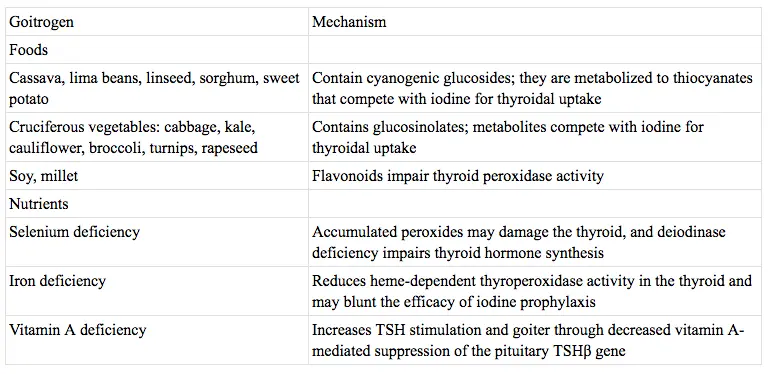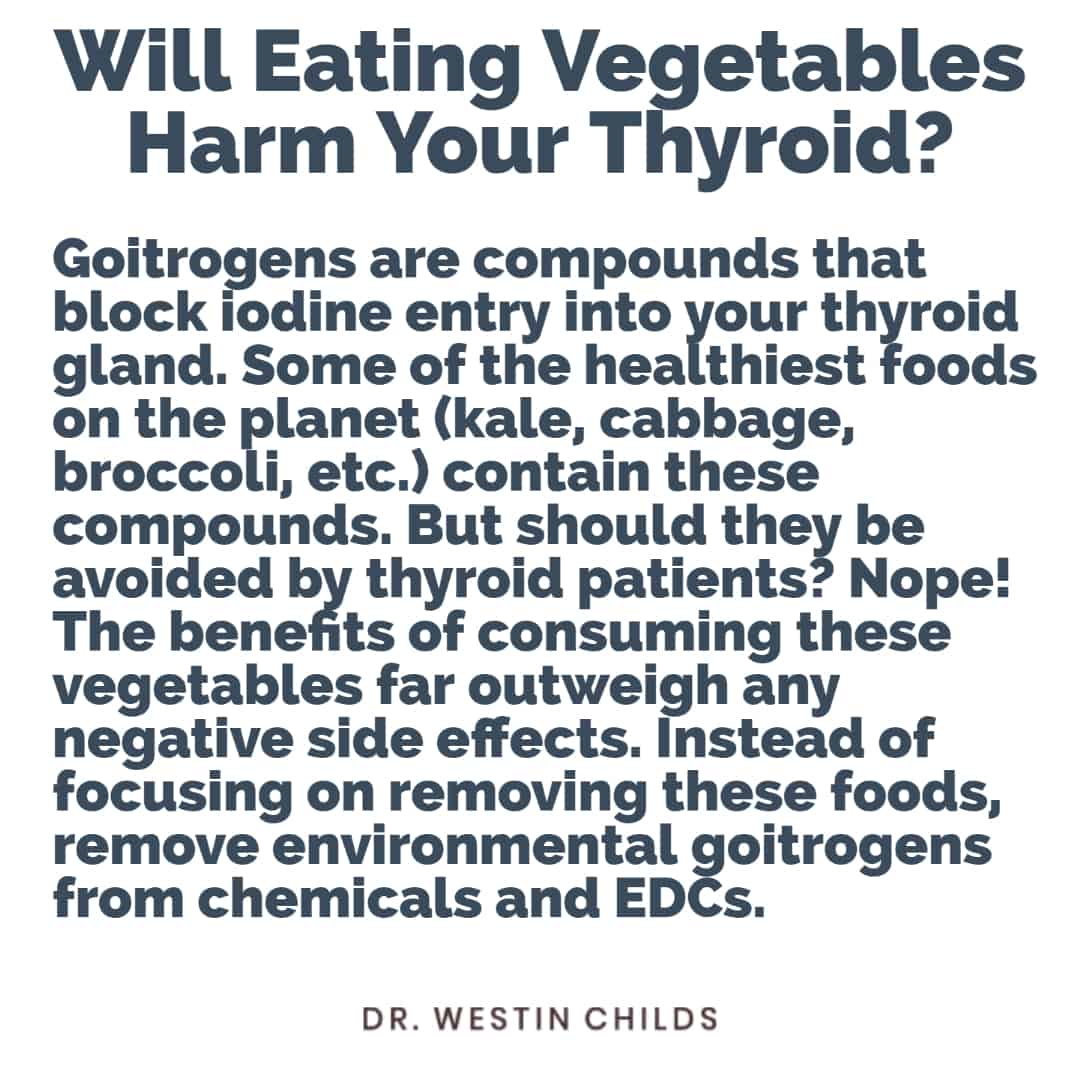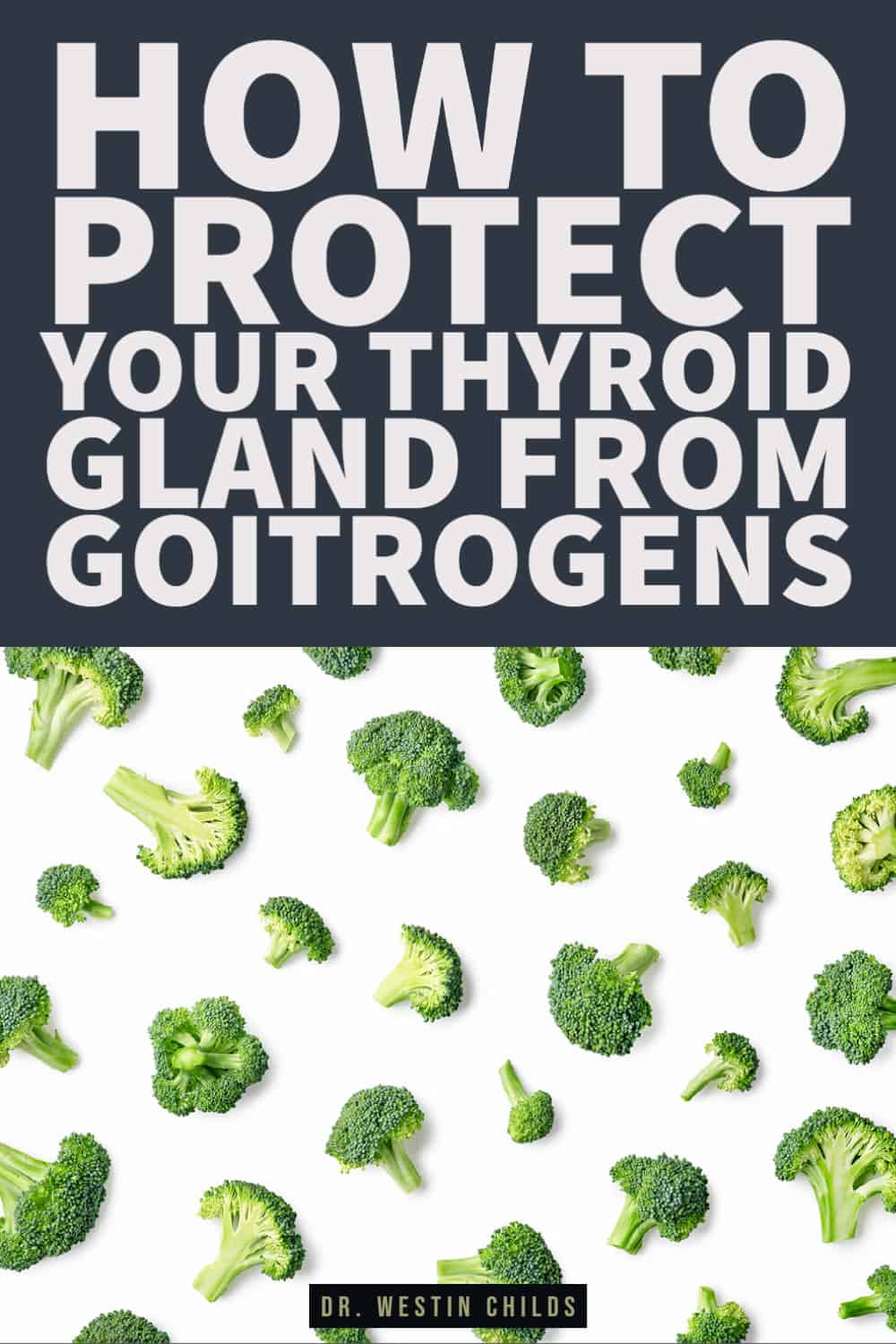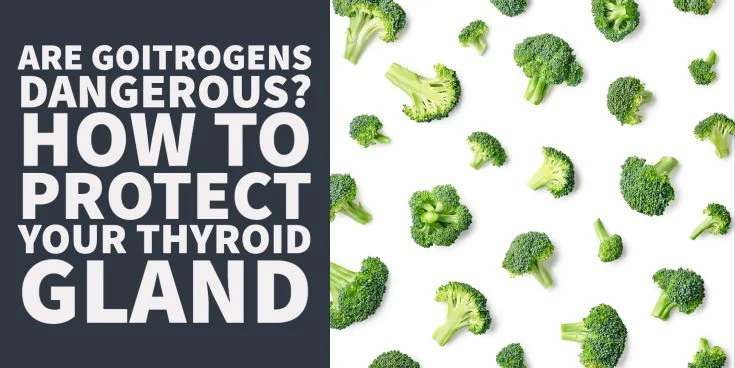Do goitrogens really cause thyroid problems?
Do you really have to avoid healthy foods like broccoli if you have a thyroid problem?
All of these questions and more will be answered in this post.
We will go over what a goitrogen is, why you probably don’t have to worry about eating healthy foods which contain goitrogenic compounds, why you should worry more about environmental goitrogens, and more in this guide:
What are Goitrogens? (The Basics)
The word goitrogen is used to define any compound or chemical which blocks thyroid function in the thyroid gland.
It is derived from the word “Goiter” which is defined as a non-specific enlargement of the thyroid gland.
The idea is that consuming goitrogenic foods or compounds may lead to an increase in the incidence of goiter.
Because of this, many people, especially those with thyroid disease, are worried that consuming goitrogenic foods may be worsening their thyroid (1).

The concern for these chemicals comes from the fact that many people are already suffering from thyroid disease (many may not even be aware) and they are concerned that coming into contact with goitrogens will further worsen or damage the thyroid function in their body.
Most of this concern comes from the fact that some food groups are known to contain goitrogenic compounds that may block thyroid function.
People then take this information and believe that these foods may be causing their thyroid problem or at least making it worse.
The problem comes when you consider that most foods that contain goitrogens actually fall into the “healthy” category.
Foods high in goitrogenic compounds include:
- Brassica vegetables (2) (Broccoli, cabbage, kale, cauliflower, brussels sprouts, bok choy, etc.)
- Peanuts
- Pine nuts
- Strawberries
- Spinach
You can see from this list that many of the goitrogenic foods are actually vegetables!
Does this mean that you should go out and stop eating vegetables?
Not necessarily.
Just because these foods do contain goitrogenic compounds doesn’t mean that they will actually block or damage your thyroid function.
In addition, even if they do contain some goitrogenic compounds the net result may be a small reduction in overall thyroid function (probably not even noticeable for most patients).
Like any therapy in medicine, we always need to consider the risks vs rewards to determine if the therapy in question is worth it.
If vegetables were actually causing problems with thyroid function we would expect to see people on diets such as Whole30 and the AIP diet with terrible results in their labs and an increase in hypothyroid symptoms.
We would also expect to see people on the ketogenic diet doing very well.
But this isn’t what we see clinically (at least not on a consistent basis).
Most thyroid patients thrive on organic whole-food-based diets (3).
So the reality is that while goitrogenic foods pose a theoretical risk the risk is probably not clinically relevant for most people.
Bottom Line: Goitrogens are substances that impair thyroid function in your body. They are found in healthy foods, medications, and in the environment.
DOWNLOAD FREE RESOURCES
Foods to Avoid if you Have Thyroid Problems:
I’ve found that these 10 foods cause the most problems for thyroid patients. Learn which foods you should avoid if you have thyroid disease of any type.
The Complete List of Thyroid Lab tests:
The list includes optimal ranges, normal ranges, and the complete list of tests you need to diagnose and manage thyroid disease correctly!
Dietary Goitrogens vs Environmental Goitrogens (EDCs)
Remember that the word goitrogens is a non-specific term that can apply to any compound or state which induces goiter formation.
Environmental goitrogens often take the form of Endocrine Disrupting Compounds (otherwise known as EDCs).
These EDCs are ubiquitous which is a fancy way of saying that they are everywhere.
Whether you realize it or not, you are coming into contact with EDCs on a daily basis which has goitrogenic potential.
EDCs are an emerging and concerning topic as it relates to hormones, including your thyroid because they can block thyroid function at the cellular level.
What this means is that they can sit on thyroid receptors in your cells and block actual thyroid hormones from doing their job.

EDCs have been shown to reduce T3 levels in the serum without altering serum TSH and Free T4 (making them difficult to diagnose and catch).
You can find a list of goitrogenic EDCs and chemicals that have been shown to alter thyroid function below:
- Organochlorine (6) – Found in pesticides
- Polychlorinated biphenyls (7) – Found in floor finish, plastics, capacitors, electrical equipment, cable insulation
- Bisphenol A (8) – Found in many plastics and resins (water bottles, toys, etc.)
- Triclosan (9)
- Polybrominated diphenyl ethers (10)
- Perchlorates (11)
- Byproducts of smoking (12)
- Certain cosmetics
Instead of hyper-focusing on your diet, it may make more sense to ensure that you are completely avoiding environmental goitrogens FIRST.
Most of these chemicals can be avoided by reducing your exposure to plastics, eating and drinking out of glass instead of plastics, avoiding heating up plastics in the microwave, and by drinking filtered water.
If you are still experiencing thyroid symptoms (or sub-optimal thyroid lab tests) then it may be time to consider changing your diet.
Should you Avoid Dietary Goitrogens? (Probably not)
This answer is going to depend on your situation and your clinical history.
While it is true that MOST people will do fine consuming goitrogenic foods there will always be some people who are exquisitely sensitive to these food groups.
But how do you know if you fall into this category and what should you do about it if you do?
The first thing you should do is adopt a whole food diet that is rich in both fruits and vegetables.
In the vast majority of cases, patients who switch from the Standard American Diet to these types of diets will do much better overall.
An improvement in these types of diets will manifest as a reduction in symptoms, reduced inflammation, more energy, and probably some weight loss.
If you’ve adopted this type of diet and you still aren’t feeling well then your next step should be to evaluate your thyroid lab tests.
If your lab tests look optimal and you are still feeling poorly then you may fall into the “sensitive to goitrogenic foods” category.
At this point you have a couple of options:
#1. Reduce or eliminate goitrogenic foods from your diet. Reducing your intake to 3-6 servings per week will probably be sufficient.
#3. Ensure that you have adequate selenium, iodine, iron, and vitamin A stores in your body.
If you follow these steps then you should feel comfortable that your dietary intake of vegetables and other foods is likely NOT causing thyroid problems.
Bottom Line: Most thyroid patients probably don’t need to worry about dietary goitrogens affecting their thyroid. As long as you avoid environmental goitrogens and ensure that you have sufficient nutrient intake you shouldn’t have to worry.
The Connection Between Iodine, Goitrogens, and Goiter
The studies regarding iodine, thyroid cancer, and thyroiditis can be confusing.
Some studies show that excessive iodine intake increases the risk of goiter and the risk of thyroiditis (such as Hashimoto’s thyroiditis) while other studies fail to show this connection.
Other studies have attempted to connect the intake of goitrogens with the risk of thyroid cancer and thyroid dysfunction with varying success.
One thing is certain, however:
Your thyroid tends to be more sensitive to goitrogens (from both food and the environment) in the setting of certain nutrient deficiencies.
For instance, the incidence of thyroid cancer tends to be higher among women who consume cruciferous vegetables but ALSO have a co-existing iodine deficiency (14).
It seems that the intake of goitrogens makes the thyroid susceptible to the negative effects of goitrogens when iodine intake is insufficient.
This is important because the primary source of iodine is through the diet (primarily through sea vegetables and iodinated salt) and some studies have shown that many Americans are likely not getting enough iodine from their diet.
This combination of insufficient (low) iodine intake, coupled with the intake of high amounts of cruciferous vegetables may be enough to cause some thyroid dysfunction.

This effect is also seen in other nutrient deficiencies such as selenium deficiency, iron deficiency, and vitamin A deficiency.
Selenium deficiency results in the accumulation of peroxides in the thyroid gland which may damage thyroid gland tissue and increase your risk of developing both goiter and thyroiditis.
Iron deficiency reduces the effectiveness of heme-dependent enzymes in the thyroid which may impair thyroid hormone production.
Lastly, vitamin A deficiency increases the stimulating effects of TSH on the thyroid gland through various genetic changes.
What’s more, is that these nutrient deficiencies may be more prevalent than most people expect.
The good news is that you can easily test for some of the deficiencies (such as evaluating ferritin as a marker of iron status).
In addition, many supplements contain these important ingredients which can be taken to help replete these nutrients in your body.
The bottom line?
You can reduce the risk that goitrogens will impact your thyroid by ensuring that you have adequate nutrient levels in your body.
Other Goitrogenic Compounds & Things to Avoid if you have Thyroid Disease
There are other factors that can alter thyroid function beyond the foods you consume and the environment.
If you are suffering from thyroid dysfunction or hypothyroid symptoms be sure to check out these factors as well.
It’s important to realize that each person is different and they will react differently to certain compounds/medications, etc.
Medications and other compounds which may cause goiter or act as a goitrogenic compound:
- Amiodarone – Amiodarone is a prescription medication used to treat some heart rhythm conditions and long-term use has been shown to cause thyroid dysfunction.
- Lithium – Lithium is a medication used to treat bipolar disorder and is known to cause thyroid dysfunction if used long-term.
- Soy or soy-enriched foods (16) – Soy may interfere with T4 absorption and interfere with thyroid hormone function at the cellular level.
- Excessive iodine intake (17) – In genetically susceptible patients increased iodine intake may stimulate thyroiditis and increase your risk of goiter.
- Excessive Dieting & Other strange diets (18) – Some diets (and macromolecule ratios) have been shown to alter T3 and T4 levels in the serum. If you are undergoing an “extreme” diet and you begin to experience the symptoms of hypothyroidism then this may be an early indicator that you may be experiencing thyroid dysfunction.
- Excessively high doses of Green Tea (19) – The use of “weight loss” pills or “fat burners” which contain extremely high doses of catechins (from green tea) may cause thyroid dysfunction in certain individuals.
Make sure you evaluate this list above to ensure that you are not experiencing thyroid dysfunction from these lesser-known factors.
Final Thoughts & Conclusion
The bottom line?
You probably don’t need to be worried about goitrogenic foods (except in extreme cases).
It’s probably more important for you to focus on avoiding goitrogenic EDCs and medications which have been shown to reduce thyroid function.
If there is any concern over your dietary intake then cooking your food before consumption and reducing your serving sizes/frequency each week should do the trick.
Lastly, before you blame your diet for your thyroid function make sure you also evaluate your nutritional status for iodine, selenium, iron, and vitamin A.
Deficiencies in any (or all) of these nutrients will exacerbate the negative effects of both goitrogenic foods and compounds.
Now I want to hear from you:
Have you been avoiding goitrogenic foods?
Has it helped you?
Are you coming into contact with environmental goitrogens?
Are you using goitrogenic medications?
Leave your comments below!








